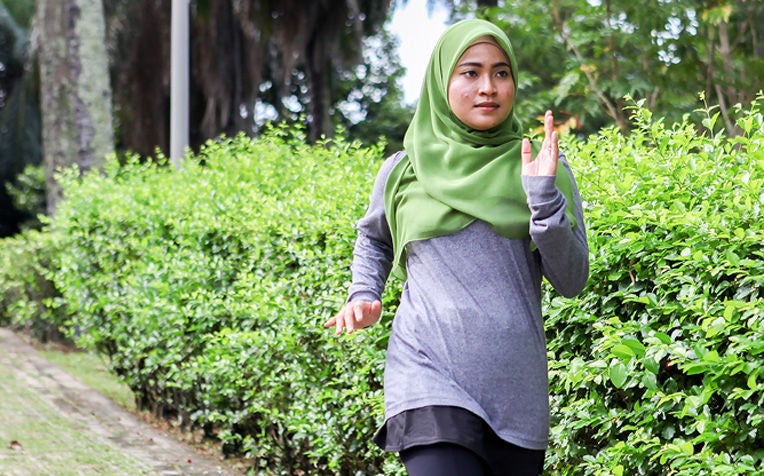
Continuing to exercise regularly during Ramadan fasting has many benefits such as maintaining and improving your immunity against infections.
Should I exercise while fasting during Ramadan?
"Exercise is generally safe for everyone. Light to moderate intensity physical activities and exercises are safe and recommended for everyone. Keep active even when you are fasting. Do not stop exercising but have a realistic physical activity plan," advises Dr Fadzil Hamzah, Senior Staff Physician from the Department of Sport and Exercise Medicine at Changi General Hospital (CGH), a member of the SingHealth group.
What is a 'realistic' physical activity plan for me?
a) For a person who leads a sedentary lifestyle
Example: A housewife who does not engage in any form of exercise apart from house chores
A realistic aim for such a person would be to break the sedentary times at home as much as possible. To start low and go slow. It is perfectly fine to begin with light intensity physical activities but to keep moving around. Keep activities simple and incorporate movement into your daily routines.
You can do this by:
Doing house chores, e.g. preparing food for the family, vacuuming and mopping the floor, and cleaning your bathroom etc. Keep your living environment clean and prepare early for the forthcoming Eid.
Taking the longer route, such as choosing to walk to the supermarket or provision store to buy groceries, instead of "grabbing"/driving or ordering them online. When leaving your home or reaching your block, you can also choose to take the staircase up to your unit instead of taking the lift.
Even when watching TV, get off the couch during advertisements and move around the house, e.g. walk to the kitchen or bathroom. Pace around the house when talking on the phone with your relatives or friends.
Monitor your daily step counts, and aim to increase your total step count by another step more than the day before.
Your long term goal is to keep physically active and achieve at least 10,000 steps/day.
b) For a person who leads an active lifestyle
Example: An office worker who currently works from home (because of COVID-19) and has been running outdoors twice a week and (prior to COVID-19) was hitting the gym three times a week at moderate intensity
For such a person, working from home allows you more flexibility to utilise your time at home. Apart from doing house chores as stated in the examples above, you can still continue with your usual exercise routines.
Continue with your outdoor runs twice a week, but you do not need to increase the frequency (no. of times per week), intensity (running speed) and the duration of the runs. You may even vary the type of your outdoor cardiovascular exercises by cycling or brisk walking, and even stair-climbing instead of running.
Exercise outdoors in your immediate neighbourhood at your preferred times of the day to avoid fatigue and dehydration while fasting.
You can even exercise at home, doing body weight exercises, e.g. push ups, planks, body weight squats, dips, leg raises, etc at home. You can even utilise household items such as performing bicep curls using a bucket filled with water as weights or using a beach towel as a resistance band, to exercise three times week.
Check out this article to know what household items you can use as workout equipment. For ideas on workouts you can do at home and tips to exercise at home safely, read this article.
The aim is to maintain your pre-fasting exercise routines, but not to make significant progress or break personal best records. Always listen to your body and modify the frequency, intensity, duration and the type of exercises accordingly.
Benefits of exercise
Exercising regularly has been shown to:
Maintain and improve your cardio-respiratory fitness and capacity thus reducing the risks of complications from an acute respiratory infection
Prevent and manage chronic medical problems like obesity, diabetes, hypertension and heart disease, which are risk factors for COVID-19 infection and its complications
Maintain and improve your immunity against all infections
Maintain and improve muscular strength and endurance
Prevent a physical decline in function due to prolonged rest and inactivity, especially in older adults, thus improving mobility and reducing the risk of falls
Reduce fatigue and lethargy, thus allowing you to function better in school or at work
Maintain and improve cognitive function thus allowing one to function better during home-based learning or at work
Maintain and improve cognitive function, thus allowing one to think and plan better in the fasting state
Manage stress and improve your mood especially during this challenging period
Read on to learn what is the recommended amount of exercise and how hard you should be exercising while fasting.
Ref: L20
Check out our other Ramadan-related health articles:
Contributed by

















